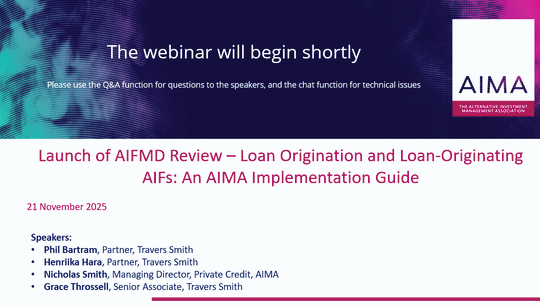Loan origination funds: From AIFMD II to Luxembourg’s bill of law 8628
By Nicolas Bouveret; Iyad El Hachem; Rachel Paton, Arendt & Medernach
Published: 24 November 2025
Bill of law 8628 (Bill) implementing AIFMD II was submitted to the Luxembourg Parliament on 3 October 2025. The Bill amends the Luxembourg law on alternative investment fund managers (AIFM Law) to implement AIFMD II into national law. Drawing upon its well-established regulatory framework for private credit funds, Luxembourg has chosen not to gold-plate the directive and has sought to implement AIFMD II into national law with minimal divergence from the new EU framework. The Bill’s accompanying commentaries provide certain clarifications on the implementation of AIFMD II into the AIFM Law. The most significant provisions are summarised below.
New regulatory framework for loan origination by AIFs: recap
AIFMD II came into force on 15 April 2024 and must be implemented into national laws by 16 April 2026. It supplements the existing AIFMD framework by establishing a dedicated and harmonised regulatory regime for loan originating AIFs and loan origination activities by or on behalf of AIFs.
The new regime aims to facilitate cross-border loan origination activities by or on behalf of AIFs across the EU. Whilst the policy objective of AIFMD II clearly promotes the right of AIFs to originate loans across all Member States, the directive does not prevent individual Member States from maintaining or imposing certain conditions on loan origination by AIFs under domestic law. It is therefore important that fund managers monitor how AIFMD II is being implemented by each Member State.
AIFMD II also introduces certain operating conditions for AIFMs managing AIFs that originate loans and/or loan originating AIFs, and additional requirements at the level of the AIFs.
Luxembourg bill of law 8628: what it proposes for loan origination
Recognition of loan origination as permitted activity for AIFMs
Consistent with the new directive, the activity of “loan origination on behalf of AIFs” is added to the list of “other functions that an AIFM may additionally perform in the course of the collective management of an AIF” under Annex I, section 2 of the AIFM Law. For this purpose, the Bill introduces definitions of “loan origination” and “loan originating AIF” that mirror the AIFMD II definitions.
The commentaries on the draft Bill confirm that the purpose of this addition is to provide the industry with greater legal certainty. Indeed, from a Luxembourg perspective, this is a confirmation rather than an amendment of existing regulatory practice, pursuant to which loan origination by or on behalf of AIFs was already considered a permitted activity for AIFMs as part of investment management functions under Annex I, section 1 of the AIFM Law, subject to certain conditions established by the CSSF for Luxembourg AIFMs. The commentaries also confirm that this activity is to be interpreted as encompassing cross-border loan origination, consistent with the policy objectives of AIFMD II.
Rules applicable to loan origination
AIFM policies and procedures. Luxembourg AIFMs managing AIFs that originate loans will have to ensure, subject to the shareholder loans exception, that they have implemented policies, procedures and processes for the granting of credit, in particular for assessing credit risk and for administering and monitoring their credit portfolio. These rules are broadly consistent with existing regulatory requirements in Luxembourg.
Borrower diversification limit. The notional value of loans originated by an AIF to any single borrower may not exceed 20% of the capital of such AIF, where the borrower is a financial undertaking, an AIF or a UCITS. For the definition of a financial undertaking, the Bill refers directly to the definition in Directive 2009/138/EC (Solvency II Directive), consistent with AIFMD II. The commentaries clarify that this rule does not apply to loans originated by a feeder AIF to a master AIF, as the AIFM Law imposes that a feeder AIF maintains an ‘exposure’ of at least 85% of its assets to the master AIF, and this exposure may comprise loans to the master AIF.
No “originate-to-distribute” strategies; risk retention requirement. AIFMs may not manage AIFs that originate loans where the whole or part of the investment strategy of those AIFs is to originate loans with the sole purpose of transferring those loans or exposures to third parties. The commentaries clarify that the prohibition does not prevent AIFs and AIFMs from selling loans originated by such AIFs; it prohibits the pursuit of an investment strategy where loans are originated solely for the purpose of transferring them to third parties. Moreover, all AIFs originating loans must retain 5% of the notional value of each originated loan, subject to certain exceptions. This retention applies either until loan maturity (for loans with a maturity period of up to eight years and for all consumer loans regardless of maturity) or for at least eight years (for other loans).
No origination of loans to consumers in Luxembourg. AIFMD II allows Member States to prohibit loan origination by AIFs to consumers in their territory, and Luxembourg has decided to exercise this option. The Bill provides that AIFs are not authorised to originate loans or to service credits granted to consumers in Luxembourg. The scope of this prohibition is defined by reference to the Luxembourg Consumer Code. The commentaries clarify that the prohibition applies to all AIFs, whether established in Luxembourg or elsewhere. They also specify that Luxembourg AIFs are not prohibited from granting loans to consumers outside of Luxembourg, subject to local laws and regulations, or from acquiring a portfolio comprising loans to consumers in Luxembourg on the secondary market following their origination by a third party, and from managing credits granted to such consumers.
No origination of loans to certain connected parties. To prevent conflicts of interests, AIFMs must ensure that AIFs do not grant loans to certain connected parties, including their AIFM and its delegates, and their depositary and its delegates, and entities part of the same group as the AIFM, unless an exception applies. For the definition of a group, the Bill refers directly to the definition in Directive 2013/34/EU (Accounting Directive), consistent with AIFMD II.
Rules that apply to loan originating AIFs only
Leverage limit. The AIFM must ensure that the leverage of a loan originating AIF it manages represents no more than 175% of its net asset value where the AIF is open-ended and 300% where the AIF is closed-ended, subject to shareholder loans exceptions. The commentaries clarify that this provision introduces a specific regime for limiting the level of leverage with which a loan originating AIF must comply, which applies without prejudice to the general regime on leverage applicable to all AIFs. Consistent with AIFMD II, the Bill provides that, for this purpose, leverage is expressed as the ratio between the exposure of that AIF, calculated using the commitment method as defined in the AIFMD Delegated Regulation, and its net asset value. The commentaries clarify that this refers specifically to Article 8(Commitment method for calculating the exposure of an AIF) of AIFMD Delegated Regulation.
Open-ended loan originating AIFs. A loan originating AIF must, in principle, be closed-ended, unless the AIFM is able to demonstrate to the CSSF that it has adopted a liquidity risk management system for the AIF which is compatible with its investment strategy and redemption policy. The Bill does not provide a definition or conditions for an AIF to be treated as open-ended or closed-ended for this purpose, nor does it establish the procedure or conditions for AIFMs to make such demonstration to the CSSF.
Entry into force and grandfathering rules
The Bill provides that the amendments to the AIFM Law, as described above, will enter into force on 16 April 2026.
Consistent with AIFMD II, the Bill introduces a grandfathering regime for AIFs constituted before 15 April 2024. In particular, AIFs that are still raising capital after that date and have loan concentrations to a single borrower or leverage levels above the applicable limits on the date of entry into force of the amended AIFM Law may maintain, but not increase, such concentrations or leverage levels until 16 April 2029. AIFs established on or after 15 April 2024 do not benefit from grandfathering; such AIFs and their AIFMs must comply with the new requirements as from the date of entry into force of the amended AIFM Law.
Similarly, the Bill provides that loans granted before 15 April 2024 are grandfathered from the following rules: AIFM policies and procedures, no origination of loans to certain connected parties, allocation of loan proceeds to the AIF, no “originate-to-distribute” strategies, risk retention requirement, and no origination of loans to consumers in Luxembourg. Loans granted after that date will need to comply with these requirements as from the date of entry into force of the amended AIFM Law.
Next steps
The Bill has been submitted and is now subject to the legislative process. Further amendments or clarifications may be made throughout that process. Once adopted, the Bill will enter into force on 16 April 2026, except for the reporting requirements, which will enter into force on 16 April 2027.
Luxembourg is the primary domicile for private credit funds in the EU. AIFMD II opens new opportunities for private credit fund managers to operate more efficiently across the EU, leveraging the existing regulatory framework, structuring options and industry expertise available in Luxembourg. The implementation of AIFMD II in other Member States should also be monitored, particularly regarding the ability to grant loans on a cross-border basis in key borrower markets. At the same time, fund managers should review their investment strategies and fund terms to anticipate any compliance issues, as the deadline for implementation is approaching.







